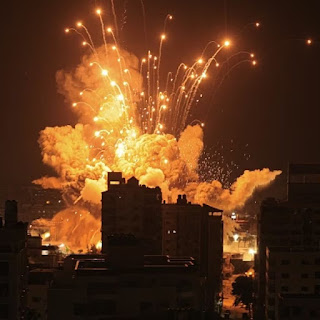On June 13, 2025 (late night June 12 in many parts of the world), the Middle East woke up to another seismic geopolitical shift. In a daring and meticulously planned operation, Israel launched a large-scale preemptive strike on Iran, targeting key nuclear and military infrastructure. The operation, codenamed Operation Rising Lion, marks one of the most aggressive moves by Israel in recent years and has thrown the region—and the world—into a heightened state of alert.
---
The Attack: A Calculated Military Move
The operation began in the early hours with dozens of airstrikes launched from Israeli bases, targeting nuclear sites in Natanz, missile factories, air defense systems, and military bases near Tehran, Isfahan, and other strategic locations. Israeli drones and fighter jets reportedly penetrated Iranian airspace with advanced stealth technology, bypassing several layers of Iranian air defense.
One of the key targets was Iran’s Natanz nuclear facility, long believed to be the centerpiece of its uranium enrichment efforts. Explosions were heard near the facility, and satellite images later confirmed significant structural damage. Iran’s Imam Khomeini International Airport was temporarily shut down, and all commercial air traffic was suspended.
---
Why Did Israel Strike?
Israel has long viewed a nuclear-armed Iran as an existential threat. Over the past few months, Israeli intelligence reports suggested that Iran had enriched enough uranium to produce up to 15 nuclear warheads in the near future. Diplomatic efforts led by the United States and European nations had stalled, and Iran was reportedly refusing access to International Atomic Energy Agency (IAEA) inspectors at key sites.
Israeli Prime Minister Benjamin Netanyahu addressed the nation shortly after the attacks, stating, “We will not wait for the threat to reach our doorstep. We have acted to protect our people and the future of our region.”
This preemptive strike is part of Israel’s long-standing Begin Doctrine, which justifies the use of force to prevent hostile states from acquiring weapons of mass destruction.
---
Iran’s Response and Casualties
The Iranian regime was quick to confirm that several military installations were hit. Though the exact casualty count remains unverified, local reports suggested dozens of fatalities, including high-ranking officers. There were also claims that Hossein Salami, the commander-in-chief of Iran’s Islamic Revolutionary Guard Corps (IRGC), was killed in one of the strikes, though Iran has neither confirmed nor denied this as of now.
Iranian leaders, including Supreme Leader Ali Khamenei, have vowed a “crushing response”, warning both Israel and its Western allies of missile and drone retaliation in the coming days.
---
U.S. Reaction: Caution and Distance
The United States, Israel’s closest ally, quickly released an official statement distancing itself from the strike. Secretary of State Marco Rubio emphasized that the U.S. had “no prior knowledge or involvement” in the operation. However, he added that any attack on American forces or installations would be met with “swift and overwhelming force.”
U.S. military bases in Iraq, Kuwait, Bahrain, and the UAE have been put on high alert, and non-essential personnel have begun repositioning in anticipation of Iranian retaliation.
---
Global Reactions and Market Jitters
The world responded with alarm. The United Nations Security Council called for an emergency meeting, while countries like Russia and China condemned Israel’s actions, labeling them as “a dangerous escalation.” European nations remained divided, with some acknowledging Israel’s security concerns while others urged restraint.
Global financial markets also reacted swiftly:
Oil prices surged nearly 5% amid fears of disruption in the Strait of Hormuz.
Gold prices spiked as investors sought safer assets.
Stock markets in Asia and Europe opened in the red, reflecting the uncertainty.
---
What Comes Next?
The coming days will be crucial. If Iran launches a direct military response, the conflict could quickly spiral into a broader regional war. Hezbollah in Lebanon, Iranian-backed militias in Iraq and Syria, and the Houthis in Yemen are all potential players in any escalation.
Israel, meanwhile, has activated its Iron Dome and David’s Sling missile defense systems across major cities and issued public alerts, urging citizens to prepare for possible attacks.
Diplomatic channels are working overtime behind the scenes. There are reports of backchannel communications via Qatar and Oman, but the chances of de-escalation remain slim in the immediate term.
---
Conclusion: A Dangerous New Chapter
Israel’s strike on Iran marks a dangerous new chapter in Middle Eastern geopolitics. While the operation may have temporarily disrupted Iran’s nuclear capabilities, it has also opened the door to a wider conflict that could engulf not only the region but draw in global powers as well.
Whether this was a bold act of self-defense or a reckless provocation depends on where one stands. But one thing is certain—the world is now watching, and the stakes have never been higher.
If diplomacy fails and retaliatory strikes begin, we may be witnessing the early stages of a new Middle East war, one that could change the global balance of power for years to come.
---



No comments:
Post a Comment